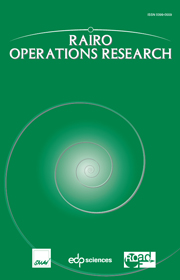Crossref Citations
This article has been cited by the following publications. This list is generated based on data provided by
Crossref.
Dohi, Tadashi
Hua Qian, Cun
Ito, Kodo
and
Nakagawa, Toshio
2005.
Optimal preventive maintenance policies for a shock model with given damage level.
Journal of Quality in Maintenance Engineering,
Vol. 11,
Issue. 3,
p.
216.
Xufeng Zhao
Quan Sun
Lei Bao
Guang Yang
and
Cunhua Qian
2008.
Research of Software Preventive Rejuvenation policy based on cumulative damage process.
p.
1371.
Chen, Mingchih
Mizutani, Satoshi
and
Nakagawa, Toshio
2010.
OPTIMAL BACKWARD AND BACKUP POLICIES IN RELIABILITY THEORY.
Journal of the Operations Research Society of Japan,
Vol. 53,
Issue. 2,
p.
101.
Zhao, Xu-Feng
Qian, Cun-Hua
and
Nakamura, Syouji
2011.
Optimal replacement policy for continuous to garbage collection.
p.
400.
Zhao, Xufeng
Nakagawa, Toshio
and
Qian, Cunhua
2012.
Optimal imperfect preventive maintenance policies for a used system.
International Journal of Systems Science,
Vol. 43,
Issue. 9,
p.
1632.
Zhao, Xufeng
and
Nakagawa, Toshio
2012.
Optimization problems of replacement first or last in reliability theory.
European Journal of Operational Research,
Vol. 223,
Issue. 1,
p.
141.
Zhao, Xufeng
Qian, Cunhua
and
Nakagawa, Toshio
2013.
Optimal policies for cumulative damage models with maintenance last and first.
Reliability Engineering & System Safety,
Vol. 110,
Issue. ,
p.
50.
Hamidi, Maryam
Szidarovszky, Ferenc
and
Szidarovszky, Miklos
2016.
New one cycle criteria for optimizing preventive replacement policies.
Reliability Engineering & System Safety,
Vol. 154,
Issue. ,
p.
42.
Zhao, Xufeng
and
Nakagawa, Toshio
2016.
Over-time and over-level replacement policies with random working cycles.
Annals of Operations Research,
Vol. 244,
Issue. 1,
p.
103.
Yang, Gaiqiang
Liu, Lei
Guo, Ping
and
Li, Mo
2017.
A flexible decision support system for irrigation scheduling in an irrigation district in China.
Agricultural Water Management,
Vol. 179,
Issue. ,
p.
378.
Meng, Haining
Zhang, Xu
Zhu, Lei
Wang, Lei
and
Yang, Zijiang
2017.
Optimizing software rejuvenation policy based on CDM for cloud system.
p.
1850.
Sheu, Shey-Huei
Liu, Tzu-Hsin
Zhang, Zhe-George
and
Tsai, Hsin-Nan
2020.
Optimum replacement policy for cumulative damage models based on multi-attributes.
Computers & Industrial Engineering,
Vol. 139,
Issue. ,
p.
106206.
Kang, Fengming
and
Cui, Lirong
2022.
Reliability analysis for systems with self-healing mechanism under two different types of cumulative shocks.
Quality Technology & Quantitative Management,
Vol. 19,
Issue. 4,
p.
454.
Sheu, Shey-Huei
Liu, Tzu-Hsin
Sheu, Wei-Teng
Ke, Jau-Chuan
and
Zhang, Zhe George
2023.
Optimal replacement policy for a two-unit system subject to shocks and cumulative damage.
Reliability Engineering & System Safety,
Vol. 238,
Issue. ,
p.
109420.
Zhao, Xufeng
Bu, Yilei
Pang, Wendi
and
Cai, Jiajia
2024.
Periodic and random incremental backup policies in reliability theory.
Software Quality Journal,
Vol. 32,
Issue. 3,
p.
1325.
Sheu, Shey-Huei
Liu, Tzu-Hsin
Sheu, Wei-Teng
Chien, Yu-Hung
and
Zhang, Zhe-George
2024.
Extended replacement policy for a system under shocks effect.
Annals of Operations Research,
Vol. 340,
Issue. 1,
p.
507.


